In this article:
Over the centuries, apple cider vinegar (ACV) has been all over the map for its multifarious uses in killing weeds, cleaning coffee makers, polishing armor, making pickles, and dressing salads.
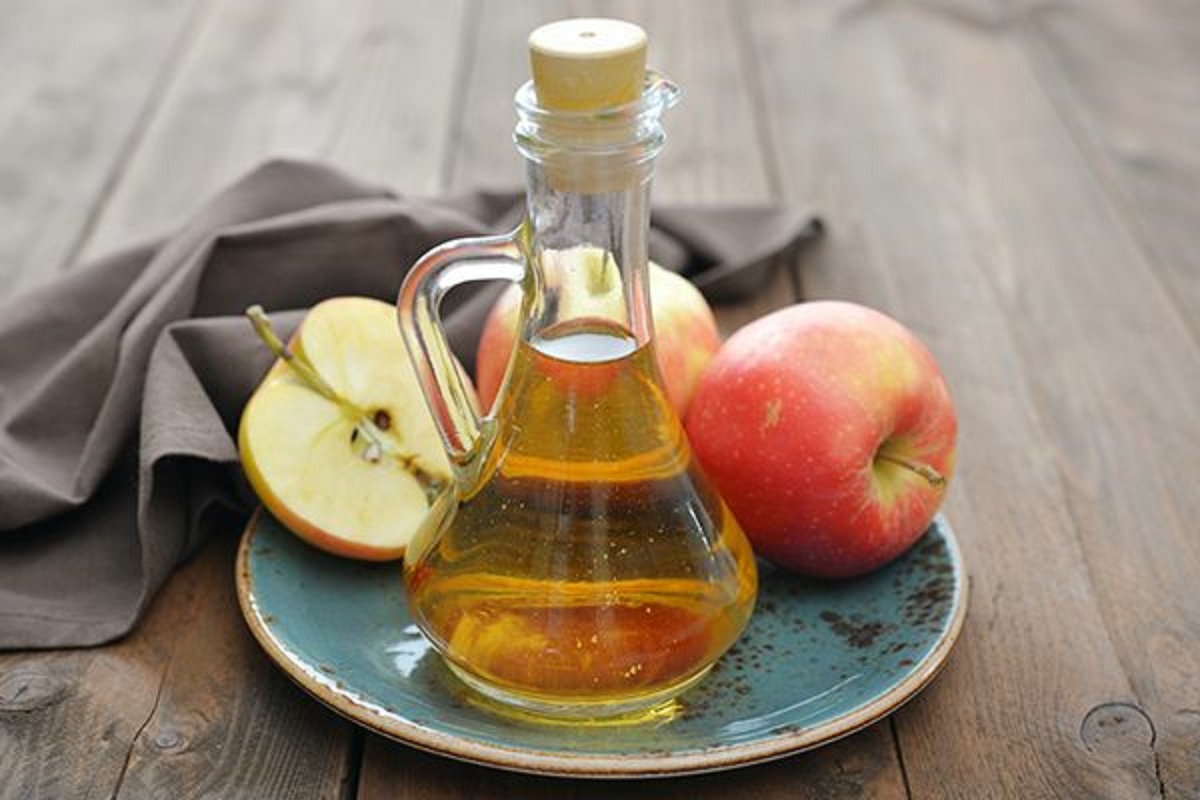
A recent health trend, ACV is being acknowledged by fitness enthusiasts, wellness coaches, and celebrities for its goodness.
ACV is being consumed religiously to purportedly resolve everything from digestive issues, and losing weight, to giving your tresses a long-lasting gloss.
Let us take a closer look at ACV to decipher the reasons behind its recent upsurge in popularity.
Nutritional Content of ACV
Aside from being one of the most popular go-to ingredients in your kitchen, ACV is extolled for its health benefits owing to its rich composition. It hosts plenty of antioxidant compounds such as acetic acid; vitamin A, B1, B2, B6, C, and E, probiotics, and a small number of minerals such as potassium, calcium, and magnesium.
Raw, unfiltered ACV is abundant in the fiber pectin and other enzymes as a contribution of the residing “mother.” (1)
Nutritional value of ACV per 100 grams:
| Nutrient | Quantity | Amount |
|---|---|---|
| Water | g | 93.81 |
| Energy | kcal | 21 |
| Carbohydrate | g | 0.93 |
| Sugars | g | 0.4 |
| Calcium, Ca | mg | 7 |
| Iron, Fe | mg | 0.2 |
| Magnesium, Mg | mg | 5 |
| Phosphorus, P | mg | 8 |
| Potassium, K | mg | 73 |
| Sodium, Na | mg | 5 |
| Zinc, Zn | mg | 0.04 |
Moreover, due to its acetic acid content, ACV helps your body absorb essential minerals from the foods you eat. (2)
Advantages of Apple Cider Vinegar
An apple a day keeps the doctor away, and so does a daily gulp of ACV. A regular intake of organic, raw, and unfiltered ACV can bestow your health with the following benefits that have been vouched for by many.
1. Controls blood sugar
Your body produces insulin to manage the level of sugar in your blood. The antiglycemic effects of ACV help improve insulin sensitivity. (3)(4)
People who have insulin resistance may benefit from 1–2 tablespoons of ACV with each meal. Especially with high-carbohydrate meals, ACV can slow down your stomach’s digestion rate, which in turn increases the time your body has to process new sugars and keeps your blood sugar levels more stable.
How to use:
Mix 1 tablespoon of ACV with 1 glass of filtered water. Drink this up to three times a day.
2. Promotes weight loss
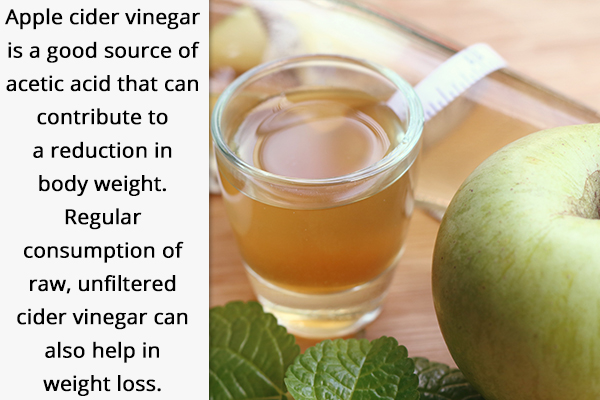
ACV is a good source of acetic acid that can contribute to a reduction in body weight. Regular consumption of raw, unfiltered ACV can also help in weight loss.
One study found that obese people who consumed acetic acid daily for 12 weeks enjoyed a significant decrease in body weight, abdominal fat, waist circumference, and triglycerides. (5) It was thought to suppress appetite. The acetic acid may also help prevent the build-up of body fat and certain liver fats. (6)
How to use:
To 16 ounces of water, mix 2 teaspoons of ACV and drink it every day. Couple this drink with your diet and exercise regimen to manage your weight woes.
3. Aids in digestion
ACV contains prebiotics and a small amount of pectin, a water-soluble fiber, that can encourage regular bowel movements. (7) This makes it a natural aid for constipation and diarrhea or to promote general gut health.
How to use:
Add 2 tablespoons of ACV to 1 glass of water and drink it 3 times a day. You can add apple or grape juice to the mix to make it more palatable.
4. Fights infection
ACV’s antiseptic properties make it effective against bacterial and fungal infections. (8) It is useful in treating infections such as bacterial ear infections and candidiasis. (9)
ACV can also be used on surfaces, such as countertops or toilets, to prevent bacterial growth. It has been shown to kill yeast growth on dentures as well. (10)
How to use:
- For an ear infection, rinse the ear with a 50% solution of ACV.
- For candidiasis, soak the area in 50% solution of ACV for 30 minutes per day until symptoms improve.
5. Lowers blood cholesterol
Scientific research indicates that ACV can help improve your blood’s lipid profile by plummeting the levels of triglycerides and low-density lipoprotein cholesterol (LDL or “bad” cholesterol).
It may also bring a spike in the levels of high-density lipoprotein cholesterol (HDL or “good” cholesterol), (5) which is essential to manage or prevent diseases of the heart.
How to use:
Drink 2 ounces of ACV twice a day to obtain its lipid-lowering effect of ACV. (11)
6. Nourishes hair
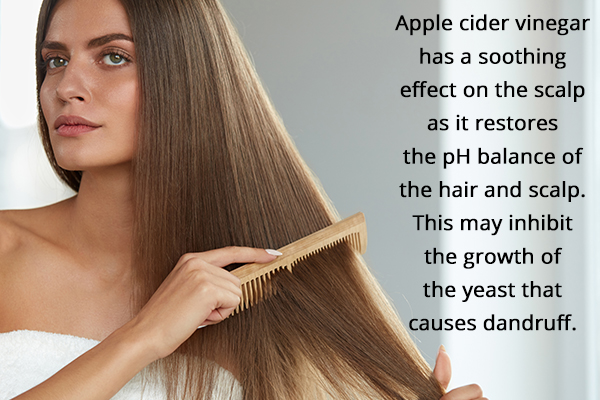
Fashion enthusiasts swear by the efficacy of ACV on hair. It can have wonderful effects on hair by making them glossy and lustrous.
ACV has a soothing effect on the scalp as it restores the pH balance of the hair and scalp. This may inhibit the growth of the yeast that causes dandruff. (12)
How to use:
- A solution of ACV and water, mixed in equal proportions, makes for a fantastic natural hair conditioner.
- To address your dandruff-ridden scalp, apply a 50/50 mixture of water and ACV to the scalp, leave it on for 30 minutes, and then rinse it off. Do this remedy once or twice a week.
7. Gives glowing skin
ACV has been praised immensely for its benefits on the skin. It can even out your skin tone by bringing it back to an acidic pH after use.
The manganese content in ACV encourages collagen synthesis and contributes to healthy skin. The ability of ACV to maintain the pH balance in your skin can help prevent various types of skin infections. (8)
How to use:
To use it as a toner, mix ½ a cup of ACV with 1 cup of water and apply the solution all over your face.
8. Combats bad breath
If you are embarrassed about your bad breath, ACV is a cheap and simple way to restore your oral health.
ACV has antibacterial properties and fights bad breath by killing the bacteria in your mouth and gums. (13) It also helps resolve the yellowing of teeth. (8)
How to use:
Mix 1 teaspoon of ACV in 1 cup of water and swish it around your mouth before you brush.
Note: As ACV can strip off the enamel from your teeth, rinse your mouth with water before you brush.
9. May strengthen bones and muscles
ACV has been shown to increase the absorption of calcium in the gut of rats. (2) Also, it contains epicatechins, which promote muscle growth. (14) These features of ACV may play a role in preventing osteoporosis and maintaining muscle mass as we age.
Filtered vs. Unfiltered ACV
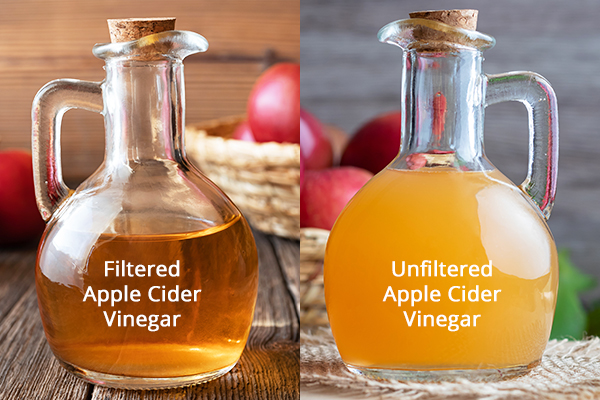
Filtered ACV undergoes filtering and pasteurization process that removes the murky cloud at the bottom. The processing refines the ACV and makes it lose many of its potential benefits.
Unfiltered raw ACV is the unprocessed ACV with the ‘‘mother’’ intact. Without any filtering and pasteurization, this version of ACV is teeming with beneficial bacteria, enzymes, and proteins, making all the difference in its composition.
How is ACV Prepared and Processed?
ACV is the final product of the fermentation of crushed apples. Yeasts are added to feed on the carbohydrate content of the apples and break it down to alcohol.
The alcohol is then treated with bacteria (the ‘‘mother’’) to convert it into acetic acid. Acetic acid is the active component in ACV and the key player behind its strong flavor.
The cloudy web at the bottom of an organic or unfiltered ACV bottle is called the ‘‘mother.’’ Similar to the starter culture in sourdough or the scoby in kombucha, the hazy ‘‘mother’’ resides as a thick blob at the bottom of your ACV bottle.
How to Use ACV?
- Never drink an undiluted shot of ACV straight up. It is best to dilute 1–2 tablespoons of ACV with 8 ounces of water and a tablespoon of honey or maple syrup for oral consumption.
- Consuming ACV on an empty stomach is the ideal way to reap its benefits.
- When including it in your beauty regime, it is suggested to apply a highly dilute ratio of ACV and water on your skin. It should be avoided entirely if you have sensitive skin.
- Spray undiluted ACV as a weedicide.
- Fruit coolers: Add 1 tablespoon of ACV to a 1:3 ratio of any fruit (cranberry or grapefruit) juice and sparkling water. Add 1 tablespoon of maple syrup and relish your drink.
- Lemon water ACV detox tonic: To 1 glass of warm water, add 1 tablespoon of cinnamon and 2 tablespoons each of ACV and lemon juice. Sprinkle some cayenne pepper. Drink this early in the morning with your breakfast.
- ACV mustard dressing: To ½ cup of ACV, add ¼ cup of olive oil, 1 teaspoon mustard, 2 tablespoons of honey, and a pinch of salt. Use this to dress your fruit, vegetable, or quinoa salad.
Precautions With ACV
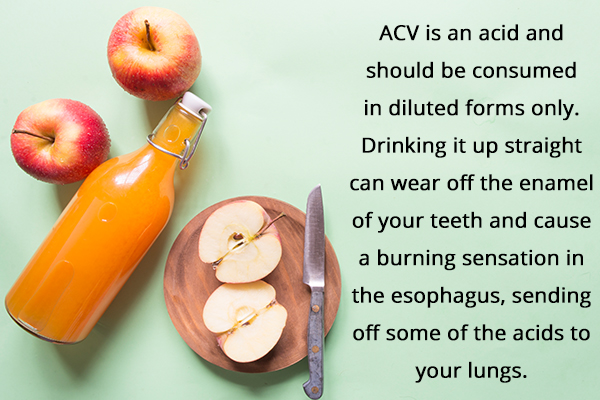
Despite the multiplicity of benefits ACV offers, there are a few downsides to its use:
- ACV is an acid and should be consumed in diluted forms only. Drinking it up straight can wear off the enamel of your teeth and cause a burning sensation in the esophagus, sending off some of the acids to your lungs.
- ACV can have adverse effects when consumed by people on high blood pressure medications (such as diuretics) by depleting the levels of potassium in their body.
- Excess intake of ACV can cause a sudden drop in blood sugar levels, which makes it mandatory for people with diabetes to be cautious of their ACV intake.
- Direct application of undiluted ACV on the skin can cause itching, irritation, and even burns. Exercise caution when using it on the face, scalp, or hair to avoid irritating eyes.
Final Word
ACV is an inexpensive, age-old kitchen ingredient that lends a helping hand to your diet and health. Use it in your salad dressings, marinate your meat with it, drink it up in diluted forms, or dab a diluted version on your skin – ACV will always deliver.
Due to the little scientific research and no concrete evidence, moderate and diluted use is the key to garner its associated health benefits.
So, the next time you go grocery shopping, make sure to purchase a bottle of unfiltered organic ACV with the “mother” to have something in your pantry to come to your rescue when needed.
- Was this article helpful?
- YES, THANKS!NOT REALLY


